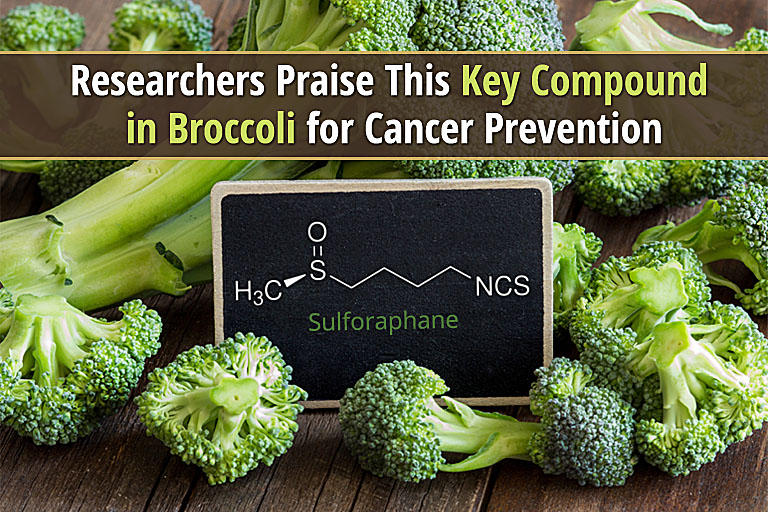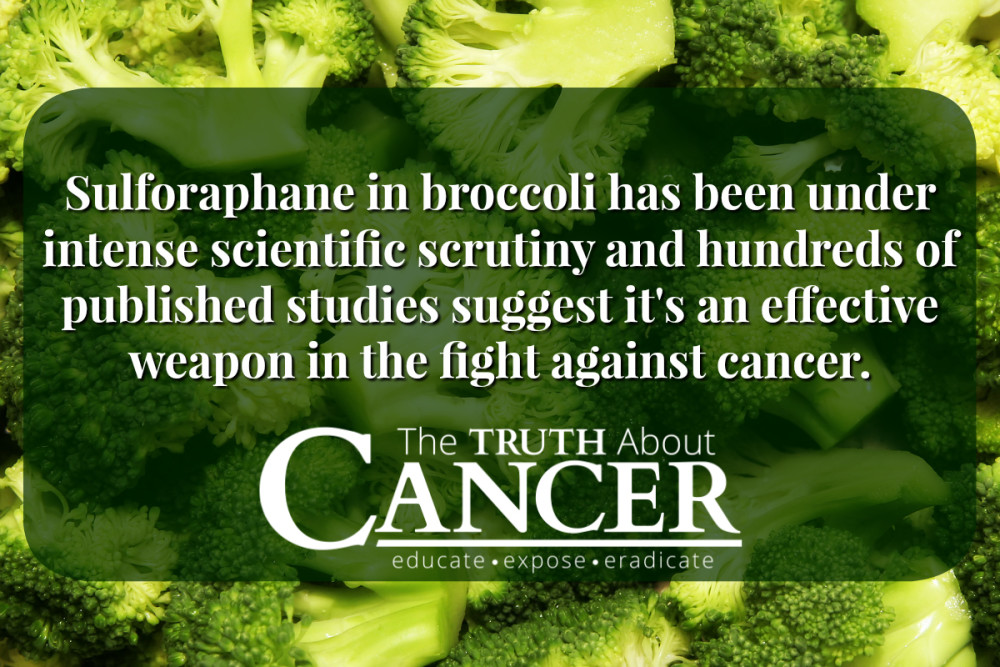Cruciferous vegetables have gained considerable attention in recent years for possessing a plethora of unique health benefits. One of the best known members of the cruciferous family – broccoli – contains a powerful nutrient compound known as sulforaphane.
Hidden deep within those luscious green stalks piled high on your dinner plate, sulforaphane has been under intense scientific scrutiny and hundreds of published studies suggest it might be an effective weapon in the fight against cancer. Scientists globally have expressed amazement over what this nature-derived nutrient compound is capable of.
A recognized chemoprotective agent, sulforaphane shows up more than 600 times in the U.S. Government’s PubMed database when queried in conjunction with the word “cancer.” This shows it’s been extensively studied, and for good reason: sulforaphane is among the world’s leading go-to nutrients for people looking to thwart the formation and progression of cancer.
Can Sulforaphane Switch Off Cancer Genes?
Cancer is often blamed on “genetic defects,” though this claim is more speculative than actual fact. Even so, sulforaphane exhibits a unique ability to regulate human genes in such a way as to protect them from mutagenesis, which is just a fancy word for detrimental genetic mutations. Sulforaphane works variably to help the body avoid such genetic failures, and thus operates as a cancer antagonist.
The human body was designed with natural, cancer-suppressing genes of its own that, due to various environmental and dietary factors, sometimes go awry. This is where sulforaphane comes in. Studies have shown that this amazing compound is capable of switching on and off genes for the purpose of stopping tumoral cells from replicating and spreading. Sulforaphane may also cause cancer cells to self-destruct, a process known as apoptosis.
Research has shown that sulforaphane not only blocks DNA methylation, which is implicated in the epigenesis of cancer formation, but also steps in to regulate certain cell cycle progression processes that would otherwise contribute, under the right circumstances, to cancer taking hold.
Advanced Prostate Cancer Responds Positively to Sulforaphane Therapy
More recently, scientists out of Oregon found that sulforaphane may possess therapeutic potential in the treatment of late-stage prostate cancer. This is significant as the American Cancer Society suggests prostate cancer will afflict nearly 15% of men at some point throughout their lifetime. Dietary consumption of sulforaphane proved effective in selectively targeting malignant cancer cells while protecting healthy cells.
Researchers from the renowned Linus Pauling Institute at the University of Oregon published evidence earlier this year showing that sulforaphane acts upon gene expression to support the body’s own natural ability to suppress tumors. Like other natural therapeutic compounds, sulforaphane has the ability to thwart disease without imposing harmful and potentially life-threatening side effects.
Eat Your Broccoli for Cancer Prevention
Sulforaphane is easy to obtain, too. It’s present in both broccoli and cauliflower, and especially in broccoli sprouts. Many natural health companies sell it in bioavailable supplement form. As always, be sure to consult a qualified health practitioner before undertaking any new medical protocol.





















Is sulphoraphane destroyed by cooking? Made more available?
The active plant enzyme that makes Sulforaphane is destroyed by heat.
Contrary to popular opinion ,broccoli is not a good source of Suloraphane,,Most broccoli contains little of the precusor to Sulforaphane Glucoraphanin SUPPLEMENTS containing Glicoraphanin,with the plant enzyme myrosinase ,will produce very little active sulforaphane.The best source is a patented broccol Seed supplement call VITALICA PLUS,,
Not sure. But eating broccoli sprouts is an excellent way to get sulphoraphane because sprouts can be 30-100 times more nutritious than the full grown plant and you don’t have to cook them.
What is the best daily dosis of consumption as raw?
I have hypothyroid. I take Nature-thyroid. Doctors say don’t eat broccoli, and a few others because it will hurt my thryroid. Is this misinformation? I went to one doctor who told me I was ignorant, he was the doctor and there was no such prescription called Nature-Thyroid. Yeah, I got up and walked out without even an explanation.
I understand that raw cruciferous vegies contain goitrogens which inhibit iodine uptake. If the cruciferous vegies are lightly cooked they may be eaten by hypothyroid and Hashimotos sufferers.
I grow broccoli sprouts (organic), and sprinkle on salads. I also take capsules for when I haven’t sprouted on time. I use for stage four breast cancer. I do take other supplements also. I am also on Capecitabine chemotherapy. All seems to be working well for me.
Where can we get the sprout is it the head of the broccoli?
Also anyone know where I can order MRET water activator and guard for cell phone
Dr. Mercola sells them on his website. Marcela.com – the best site that I know of!
I misspelled his name the second time. Sorry. It is mercola.com
A broccoli sprout is grown from seed. You can use a canning jar, seeds in the bottom, add water, put into your window sill and wait a few days.
I have totally enjoyed the almost 9 episodes. Been sharing and finding some I shared with have already had chemo and operations. I love broccoli! Is it better raw , steamed or cooked? I am into 5th day twice a day of detox, are there things I got to watch for that it is doing some good? I am drinking water and green tea. Getting the garbage out. As soon as started detox, annoying cough came on. By the way when my parents and I moved West in 1968, doctor found those pea size things on mom and many biopsies. Mom lived to a good age 82. Nuts seem to be the food when I don’t feel like eating much.
In 1982, my first year of medical school, our oncology professor took a few of us out to lunch. He confided in us that someday in our careers we would see that the cruciferous plant foods (broccoli, cauliflower, brussels sprouts) would be recognized as one of the main answers to cancer. I’m still waiting and waiting and waiting for mainline medicine to accept that truth and run with it!
I would really appreciate links to some of the nutrition products mentioned in the series.
Unless I’m missing it, I don’t see how much of anything to eat like the broccoli etc. Not to many questions are answered. Taking in all this wonderful information is sometimes very overwhelming..maybe chemo brain. LOL
We have tried Hydrogen Peroxide (food grade). The book “One Minute Cure” by Madison Cavanaugh made a lot of sense to me. It gives the cells oxygen and is effective and inexpensive, something that ‘big pharma” is trying to surpress. We are enjoying the your series–so keep the good work
Yes, all cruciferous veggies are bad for the thyroid. You can
eat them, but in small amounts only and steamed slightly.
Google which vegetables are bad for Thyroid.
Also go to Stop The Thyroid Madness if you haven’t already.
Lots of information, very good site.
Doctors know diddly about the thyroid, just what the TSH is
& never mind the T4 & T3, then tell you to take Synthroid.
They don’t even know what Natural Thyroid is. Sorry for going on & on
But I get angry what the doctors & Big Pharma are doing to unsuspecting
trusting patients.
Suzy Cohen is a pharmacist who specializes in thyroid. Just google her name and get on her website for a wealth of info.
What are your thoughts on the use of Himalayan salt?
Hi Sandra, Here is a link to a video that where we interviewed Dr. Brownstein about salt: https://thetruthaboutcancer.com/video-benefits-of-salt-best-salt-to-use/
Micro sprouts are more nutritious than sprouts. You grow them for 10-14 days in an organic soil. They are up to 36 times more dense nutrient than the adult plant.
Susan do you have a source?